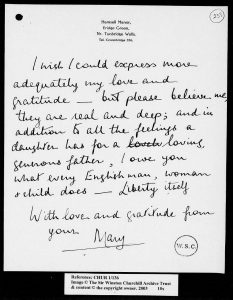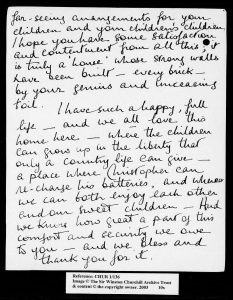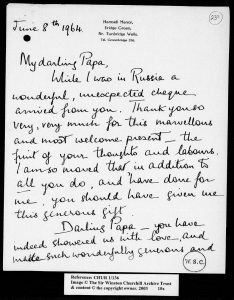
Finest Hour 164
Remembrances – My Dear Mama

Winston Churchill, Parliament Square, London © Sue Lowry & Magellan PR
February 8, 2015
Finest Hour 164, Special Edition, September 2014
Page 14
By Emma Soames
I write this in the week following the death of my mother: The Lady Soames LG DBE, to give her full and glorious title. I hope I can articulate from my brimming heart a few observations and memories of her without it tipping over into sentiment.
In the autumn of 1968, accompanied by our Labrador and Jim, my sister’s black pug, we all set off with my parents on the boat train to Paris. We were given a fabulous and rather tearful send off by, among others, my grandmother Clementine—you would have thought we were going to Timbuktu for five years. Eight hours later we arrived at our new home, the British Embassy in Paris, a beautiful building near the Elysee Palace that was once the home of Napoleon’s sister.

2025 International Churchill Conference
My parents had been briefed to persuade General de Gaulle to change his “non” to “oui” over Britain joining what was then called the Common Market. The General caved in and the rest, as they say, is history—albeit one that some now wish to rewrite.
While my father used his considerable skills and powers of persuasion to talk round Le General, my mother charmed him over delicious dinners at the embassy. (Among other things, they talked of the end of the war when my mother accompanied her father and Le General to inspect the French troops still fighting on the Northern Front.)
At the Embassy we lived a charmed and wonderful life. The French were ecstatic to have “une fille de Churchill” in Paris. With her charm, her excellent French and her dedication to being as good an Ambassadress as she possibly could, she didn’t disappoint.
Much to my surprise the happiness of the French extended to “la fille de l’ambassadeur.” All sorts of doors magically opened: I got tickets to the final at Roland Garros, I managed to get an audition for the French production of Hair, and I could borrow frocks from all the couturiers (a privilege I would now kill for, but at 19 I was more interested in wearing Biba).
My parents filled the house with flowers and laughter. They flung the most wonderful parties—a large dance for my brother and me, complete with a British rock band and another, grander and more sedate one for HM the Queen on a state visit to Paris. And every year they gave a magnificent lunch for many of the British who came over to watch the Prix de l’Arc de Triomphe. Everyone was served a cold partridge wrapped in some exotic sauce, which impressed the French no end.
Mary Soames lived a truly extraordinary life in which she met T.E. Lawrence, Charlie Chaplin and Stanley Baldwin. And she was close to all the top brass who were running the war under the command of her father, from General Montgomery to “Prof” Lindemann. With her father she stayed at the White House with the Roosevelts, and attended the Potsdam conference, where she did the flowers and dined with Joseph Stalin.
She was driven by the most highly developed and old-fashioned sense of duty to Queen, country and family I’ve ever had the good fortune to come across. But this was tempered by an enormous sense of fun and enjoyment, as demonstrated in the Embassy.
Earlier, in 1964, she ended up having to fight the general election campaign for Christopher on her own, as he had fallen off a horse and broken his pelvis. I went with her round his Bedford constituency, where she gallantly canvassed from door to door, addressed meetings and visited factories. She set an extraordinary pace and one of my abiding memories of her is following her everywhere at a brisk trot as she would literally run down streets as though life were too short to spend walking from place to place.
Nothing demonstrates her sense of duty better than the dilemma she faced at the beginning of the war. In her memoirs I found a passage demonstrating her agonising before she joined the ATS: “I did some real heart-searching as to where my duty lay. I knew my parents depended on me but…working at a hospital library seemed rather inadequate set alongside the challenges and sacrifices confronting so many.”
And goodness, did her sense of duty extend to family! In 1983, I gave birth to my daughter in Jerusalem, and my mother determined to come and help us. She turned up at our bungalow on the outskirts of the city, bearing soap and a pair of marigold gloves. Although cooking was never her forte, she took over the kitchen, produced some creditable shepherd’s pies, and did some very noisy washing-up. She was a great support to me and offered some terrible advice about looking after a very small baby. She was way outside her comfort zone, but flung herself into our life.
Of course, when the Israeli government heard she was in town, she was bombarded with invitations from the mayor and the government, but she turned them all down: at that time her duty lay with her daughter.
It wasn’t always all sunny between us, of course, and I was the recipient of some Exocet missiles she despatched to me over the years when my behaviour didn’t measure up. But she was staunch in her forgiveness and fiercely loyal to her children. She leaves behind a deeply united family determined to keep her memory burning brightly.
This article first appeared in the July issue of Saga magazine, where The Hon. Emma Soames is editor-at-large. Her further reflections were broadcast by the BBC Radio 4 on June 6th; the podcast may be viewed at http://bbc.in/1uRRNfT
Subscribe
WANT MORE?
Get the Churchill Bulletin delivered to your inbox once a month.





